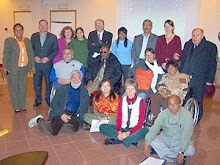If self-care groups of persons with disabilities and chronic conditions take a more active role in their own care, what impact does it have on health care and social professionals? Does it mean that their role is diminished? Does it improve the working of health and social professionals? Does it raise any specific ethical issues?
The participants in the meeting held in Rome (Italy) in December 2007 concluded that:
1. Health care professionals often do not learn about needs of persons with disabilities and chronic conditions. Thus when they receive requests related to persons with disabilities they tend to delegate to “rehabilitation” professionals or find ways to not to accept such requests.
2. Training of health care professionals tends to focus on disability or specific medical condtition and does not teach them to look at global needs of a person.
3. Health professionals may be few and overworked and thus find difficult to participate in a dialogue about paradigm shift.
4. Health professionals tend to focus more on crisis, emergencies, services provision and clincal roles rather than engage in dialogue, interact and learn.
5. Those health care professionals who do manage to engage in a dialogue for a greater role of persons with disabilities, persons with chronic conditions and/or family members in their own care and their right to take decisions about their own lives, find it improves quality of their work.
6. There are areas of health care expertise that can not be delegated to affected persons or families and health care professionals need to provide services in these areas. At the same time, there are many areas where affected persons can play a more more active role and health care professionals need to review these with self-care groups in a more open manner.
Subscribe to:
Post Comments (Atom)


No comments:
Post a Comment